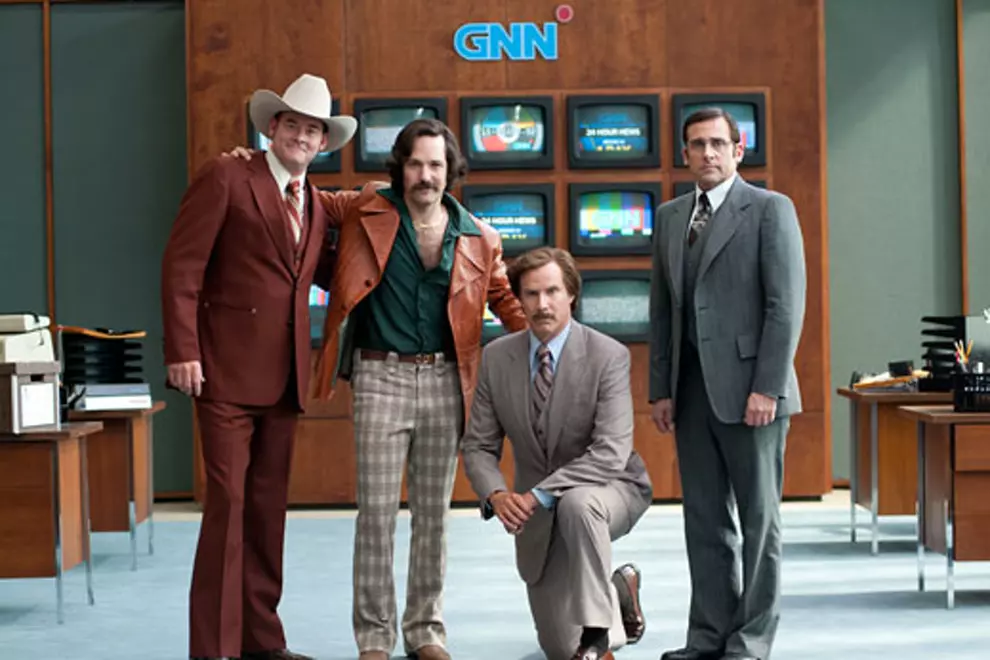ANCHORMAN 2: THE LEGEND CONTINUES
![]()
There's a functionality to a comedy movie that boils its success down to something really simple: did you laugh? If the answer is yes, the film has essentially succeeded. How it makes you laugh is effectively irrelevant: the comedy has justified its own existence by achieving that most modest of goals. This elemental equation is worth keeping in mind when critically confronted with something like Anchorman 2: The Legend Continues, a frequently-hilarious film that often falls on its ass; a wildly-enjoyable movie that's also terribly written; a giddy victory lap that never lets you forget it's a cash-in sequel.
The successor to Anchorman: The Legend Of Ron Burgundy is a big, silly, ridiculous mess, in which the principle cast from the decade-ago original - Will Ferrell, Steve Carell, David Koechner, and Paul Rudd - and some notable new players - best being Kristen Wiig and Greg Kinnear - improv their way through a series of sketches slapped together into a story. In many ways, the 'story' is immaterial to your enjoyment of the film: the fact that half the material in the trailer ended up on the cutting-room-floor speaks volumes. It's one of those films where there's an endless tenor of jokes, but little carefully-constructed comedy. Its anarchic run of free-associations may be hilarious - a trip to Rudd's secret condom locker is worth the price-of-admission itself - but they feel like endless asides; the whole film taking its id from Carell's confusing non-sequiturs.
If we're to attempt to take Anchorman 2 as anything other than a rapidfire run of tenuously-related gags, then Will Ferrell and Adam McKay's script is a very gentle satire of cable news culture, and corporate-owned media interests. The old news crew end up with a new gig at the world's first 24-hour news-channel, which is bankrolled by an unscrupulous, synergy-minded, agenda-riddled Australian who delights in the fact that he “owns” the news. Ferrell's blowhard newscaster Ron Burgundy effectively invents the Fox News format by wondering aloud “why can't we tell them what they want to hear?”; thus leading to a proliferation of patriotism, boobs, and wild speculation. Whilst musical-numbers sung in tribute to a shark or talk of giving crabs to Florence Henderson is fun and all, Anchorman 2 feels like it actually means something when it satirises the manufactured stories and blatant fearmongering that pass for cable-news discourse.
If the original film's '70s setting provided a forum to explore - and I use the word lightly - feminism's challenge to the white-male stronghold of the workplace, here the turn-of-the-'80s timeframe makes race the next frontier. Our loveable news crew are all revealed to be racists, and the presence of a black, female boss (Meagan Good, failing to find the black character within her bland caricature) stands as a big, obvious symbol. Inevitably, this theme goes where it's always destined to: Ferrell around the dinner table of his boss's black family, talkin' jive as his own form of 'cultural assimilation'. Far better is when newsman and newsboss fuck, in a montage overlaid with images of Jackie Robinson, Kirk and Uhura kissing on Star Trek, and Diff'rent Strokes: benign symbols of integrated America treated to deserved mockery. In an era of tedious internet 'outrage,' seeing Anchorman 2 gleefully galumph all over tread-carefully terrain is refreshing.
Don't miss a beat with our FREE daily newsletter
But that's the old standard of comedy: you can joke about race - or crack, or rape, or the fact that Rupert Murdoch has been dictating media content for decades - all you want, just as long as it's funny.
COMPUTER CHESS

If you're in Melbourne, hope you have an air conditioner. And: rejoice! Andrew Bujalski's Computer Chess - one of the very-best films of 2013 - is coming for an extended season at ACMI over summer. Bujalski's remarkable picture initially poses as a mockumentary, a found-footage reel from a 1980 computer-chess tournament staged in a dingy Austin motel. Bujalski makes the glorious choice to shoot the film on of-the-era 'technology': the soupy, fuzzed-out black-and-white of an old tube-valve video-camera making the distant past feel like some remnant of an alternate sci-fi reality; the primitive computer-programming on display matched by the primitive visuals. The filmmaker tunes into the fact that formats have intersected with individual and cultural memory, knowing that, for new millennial audiences, there's no greater form of time-travel than dated technology.
Bujalski's previous films - 2002's Funny Ha Ha, 2005's Mutual Appreciation, 2008's Beeswax - were seminal mumblecore texts, in which the no-budget product produced an unobtrusive visual style that left the dialogue front-and-centre. The wordiness hasn't dissipated with Computer Chess, but, this time, it's a wild directorial ride; Bujalski and cinematographer Matthias Grunsky impishly experimenting with their Sony Portapak camera, pushing it to the point of breaking. It suits the theme of the film, which is about nerds on the technology frontier, grappling with the philosophical ideals of the forthcoming digital age.
These aren't the mainstream nerds of The Big Bang Theory, but the anxious, sweaty geeks of three decades hence; the weird obsessives and sociophobes inhabiting an arcane, clandestine realm of copious eggheadery and bountiful awkwardness. With a cast composed chiefly from actual computer programmers, Bujalski captures this prehistoric cave-society in all its daggy glory, and then some; his film a commentary on Cold War Era America that challenges the comfort-levels of the modern viewer. When his actors talk stoned-philosophical about a surveillance-state future that makes 1984 a harbinger of what's to come, they're just describing our NSA now. Computer Chess starts out seeming like a minor style-piece, then grows into something unexpectedly profound: both a fastidious history lesson and a film totally attuned to this moment in time.
















